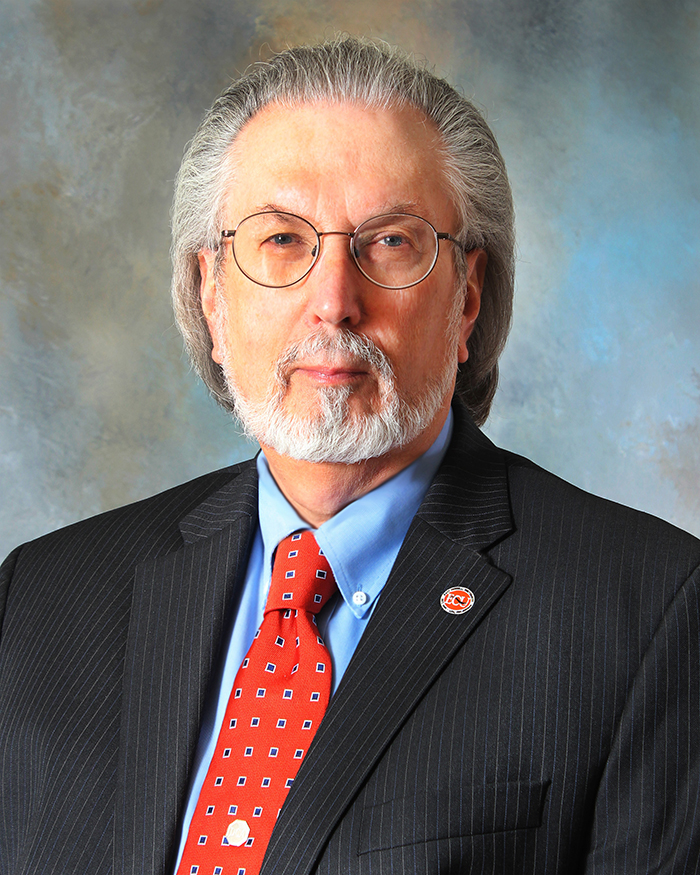By GALEN HAWES
ADA - A former East Central University administrator is now a Hall of Famer.
Dr. Duane C. Anderson, who served in multiple administrative roles at ECU, will be inducted into the Oklahoma Higher Education Hall of Fame in November. To date, he is only the third ECU educator to achieve this prestigious honor.
"I am especially honored to be following Dr. Bill Cole and Dr. Gerald Williamson," Anderson said. "That's pretty good company. I met many of my good friends at ECU and worked with a lot of outstanding faculty and administrators there."
The 26th annual Oklahoma Higher Education Hall of Fame induction ceremony will take place on Nov. 4 in the Nigh Center on the University of Central Oklahoma campus.
"It's always a great honor to be recognized by your peers," said Anderson. "That's what this Hall of Fame is all about - friends and colleagues across the state recognizing the impact you have made in higher education."
ECU President Katricia Pierson offered high praise for Anderson's accomplishments.
"Dr. Anderson was an innovative and skilled administrator and was responsible, either directly or indirectly, for many improvements across the ECU campus," said Dr. Pierson. "He always carried himself with the utmost professionalism and his love for this institution informed the positive changes he brought to campus, both inside and outside the classroom. Dr. Anderson's legacy at ECU is rock solid."
Dr. John Hargrave, retired ECU president and current ECU Foundation CEO, nominated Anderson for the honor.
"It has been my experience that there is no one more knowledgeable, dedicated, and loyal to higher education than Duane Anderson," said Hargrave. "During my tenure as ECU president, he was provost. His knowledge and understanding of higher education extended far beyond our own campus."
To be eligible for induction into the Oklahoma Higher Education Hall of Fame, an individual must have been employed by one or more public or private institutions of higher education in Oklahoma on a full-time basis for at least 10 years. Anderson served at ECU for 25 years.
"Not everyone has the opportunity to stay in a place long enough to see positive growth and change," Anderson said. "I was fortunate to able to see the physical plant, as well as the student body, grow significantly over the years."
Anderson first earned his Associate of Arts degree at Bismarck Junior College in 1966. He then earned his Bachelor of Science in Education in 1968 and his Master of Arts degree two years later from the University of North Dakota. He went on to earn his doctorate in British History from the University of Oklahoma in 1976.
Before coming to ECU, Anderson held several positions at El Reno Junior College (now Redlands Community College) from 1975 to 1986. He later served as the director of Continuing Education at Mesa State College in Grand Junction, Colorado, from 1986 to 1990.
In 1990, Anderson arrived at ECU as associate vice president for Academic Affairs and dean of the School of Graduate Studies. He also taught History courses on campus. In 1995, he was promoted to vice president of Academic Affairs. In 2006, he was promoted to provost. He also served as interim president of ECU in 2009 during a transition period between presidents Richard Rafes and Hargrave. He retired from ECU in 2015 as provost emeritus.
"It was rewarding to work at an institution with a reputation for academic quality, and one that is so important to the life of the local community and the entire region," Anderson said.
As interim president, he drove a campaign for the establishment of a Centennial Endowment. The goal was to raise five $15,000 scholarships. That goal was easily exceeded as 22 scholarships were created for a total of more than $455,000. Ultimately the campaign raised a total of $1.4 million and one of the Centennial History scholarships is named in honor of Anderson and his wife, Marian.
Anderson's guidance was instrumental in spearheading transfer articulation agreements between ECU and Eastern Oklahoma State College, Murray State College, and Seminole State College to help ensure more ease for students in the transfer process. He also led the effort to infuse computer technology in the teaching and learning process.
As chair of a faculty committee that revised the General Education curriculum in 1996, he developed the institution's strategic planning efforts and highlighted the importance of graduate programming. He oversaw the incorporation of service learning into the curriculum and helped establish various campus-wide programs to retain students and encourage student success.
"It was rewarding to see so many students make it through," Anderson said. "I miss commencement exercises the most, I think. To see all those happy students and even happier family members - it was always the high point of the year."
Anderson also negotiated an innovative shared program delivery at Southeastern Oklahoma State University. Students combined ECU's Nursing courses with Southeastern's General Education and Science support courses to earn the ECU Bachelor of Science in Nursing degree.
He was active on the Council on Instruction of the Oklahoma State Regents for Higher Education, chairing the Electronic Media Committee for 11 years, and was a founding member of the Oklahoma Research Day Council. Notably, the percentage of faculty at ECU holding doctorate degrees continually increased under his leadership.
The Oklahoma Higher Education Heritage Society has sponsored the annual Hall of Fame induction ceremony since 1991. The Society is a non-profit organization dedicated to preserving the heritage of higher education in Oklahoma and chronicles the progress of the state's higher education from territorial days through the present.
-ECU-

